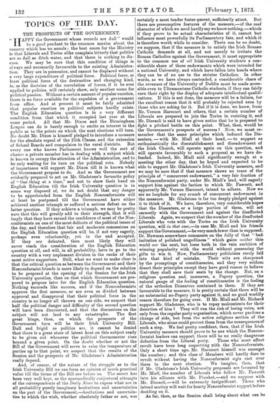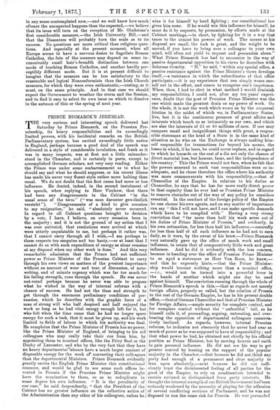TOPICS OF THE DAY.
THE PROSPECTS OF THE GOVERNMENT.
.‘ ITAPPY the Government whose records are dull" would
_I be a good pendant to the common maxim about the country which has 'no annals ; the best omen for the Ministry is that Liberals and Tories alike complain bitterly that politics are as dull as ditch water, and that there is nothing to dis- cuss. We may be sure that this condition of things is always and necessarily favourable to the existing Administra- tion. They are in possession, and cannot be displaced without a very large expenditure of political force. Political force, at least political force of the destructive and changing kind, is, as the doctrine of the correlation of forces, if it be ever applied to politics, will certainly show, only another name for political passion. Without a certain amount of popular emotion, there is no force available for the expulsion of a government from office. And at present it must be fairly admitted that popular emotion on political subjects hardly exists. The English Education question is in a very different condition from that which it occupied last year at the same period. All that Mr. Dixon and the Birmingham League can do is barely enough to excite an interest in the public as to the points on which the next elections will turn. No doubt Mr. Dixon is himself pledged to introduce a measure for the absolute repeal of the 25th Clause, and the extension of School Boards and compulsion to the rural districts. But every one who knows Parliament knows well the sort of chance a private member has in dealing with a subject which is known to occupy the attention of the Administration, and to be only waiting for its turn on the political rota. Nobody of importance will support Mr. Dixon till it is known what the Government propose to do. And as the Government are evidently prepared to act on Mr. Gladstone's favourite policy of "One thing at a time," and not to show their hand on English Education till the Irish University question is in some way disposed of, we do not doubt that any danger to be apprehended from the English Nonconformists will at least be postponed till the Government have either achieved another triumph or suffered a serious defeat on the latter question. If they achieve a triumph, we may be pretty sure that this will greatly add to their strength, that it will imply that they have earned the confidence of most of the Non- conformists on one of the most delicate of the political issues of the day, and therefore that fair and moderate concessions on the English Education question will be, if not very eagerly, perhaps even reluctanctly, yet in the end accepted. If they are defeated, then most likely they will • never reach the consideration of the English Education question at all, and will, in all probability, have to go to the country with a very unpleasant division in the ranks of their . most active supporters. Still, what we want to make clear is that the critical question as between the Government and their Nonconformist friends is more likely to depend on the solution to be proposed at the opening of the Session for the Irish University question, than on that which Government are pre- pared to propose later for the English Education question. Nothing succeeds like success, and if the Nonconformists approve the first measure, or are even so divided between approval and disapproval that their political force in the country is no longer all thrown on one side, we suspect that half the political danger and difficulty of the second question will have been discounted, and that the discussions on the subject will not lead to any catastrophe. The first great hinge, then, on which the prospects of the Government turn will be their Irish University Bill. Dull and frigid as politics are, it cannot be denied that there is a great store of latent heat on this subject ready to be given out whenever the political thermometer rises beyond a given point. On the doubt whether or not the • Bill of the Government will serve to raise the temperature of parties up to that point, we suspect that the results of the Session and the prospects of Mr. Gladstone's Administration really depend.
And, of course, of the nature of the struggle as to the Irish University Bill we can form no opinion of much practical 'value till the terms of the Bill are before us. The secret has been very well kept, as the spasmodically conjectural attempts of the correspondents of the Daily News to expose what are in all probability purely imaginary hesitations and uncertainties on the part of the Government,—hesitations and uncertain- ties to which the wish, whether absolutely father or not, was
certainly a most tender foster-parent, sufficiently attest. But there are presumptive features of the measure,—of the rear character of which we need hardly say we know nothing, —which if they prove to be actual characteristics of it, cannot but influence most powerfully its Parliamentary fate, and which it. is therefore worth while to consider. There can be no doubt, we suppose, that if the measure is to satisfy the Irish Roman, Catholic demands at all, and not merely to irritate the Boman Catholics against the Government, it must appropriate. to the common use of all Irish University students a con- siderable share of those endowments which were intended for a national University, and which have fallen into hands where they can be of no use to the stricter Catholics. In other words, as we have always contended, a considerable share of the revenues of the University of Dublin must be made acces- sible even to Ultramontane Catholic students, if they can fairry earn their right by the display of adequate intellectual qualiff- cations. If this is not done, the measure will be a failure, for the excellent reason that it will probably be rejected even by those who are asking for it. But if it is done, we know, from Mr. Vernon Harcourt and others, that a certain number of Liberals are prepared to join the Tories in resisting it, and Mr. Disraeli is said to have given notice that be is prepared to fight a pitched battle on this point. What, then, would be the Government's prospects of success ? Now, we must re- member that the same principles which induced the Dis- senters, — with Mr. Miall at their head, — to support sa enthusiastically the disestablishment and diseudowment of the Irish Church, will operate again on this question, and will operate favourably to such a proposal as we have de- fended. Indeed, Mr. Miall said significantly enough at a meeting the other day, that he hoped and expected to be able to support Mr. Gladstone's Irish University measure, an& we may be sure that if that measure shows no trace of the principle of "concurrent endowment," a very fair fraction of the Nonconformist party, under Mr. Miall's lead, will eagerly support him against the faction to which Mr. Fawcett, and apparently Mr. Vernon Harcourt, intend to adhere. Now we see no loophole for any crumb of concurrent endowment in the measure. Mr. Gladstone is far too deeply pledged against it to think of it. We have, therefore, very considerable hopes that the Dissenters, or a large portion of them, will act earnestly with the Government and against the disaffected Liberals. Again, we suspect that the number of the disaffected. Liberals who vote with the Tories on the Irish University question, will in that ease,—in case Mr. Miall and his friends support the Government,—be very much fewer than is supposed.. Dr. Newman somewhere comments on the folly of that "bad' imitation of polished ungodliness" which gains neither this. world nor the next, but loses both in the vain ambition of winning popularity with the world without possessing the gifts to win it. Now, Parliamentary politicians rarely fall
into that kind of mistake. Their wits are sharpened by the proraptings of constituencies, and they very seldom, desert their principles except they have good reason to believe that they shall save their seats by the change. But, on a religious question and, moreover, a Popery question, the natural gauge of the feeling of constituencies is the feeling of the orthodox Dissenters contained in them. If they are favourable to the measure, it is pretty certain that there will be no substantial no-Popery party against it, and no good worldly reason therefore for going over. If Mr. Miall and Mr. Richard support Mr. Gladstone, who is to repay malcontents for their desertion of him? They will run the risk of losing votes, not only from the regular party organisation, which never pardons a change of aide, but from the active religious section of the Liberals, who alone could protect them from the consequences of such a step. We feel pretty confident, then, that if the Irish University measure should prove to be one which the Noncon- formist leaders can support, there will be no really dangerous defection from the Liberal party. Those who most affect revolt have been long coquetting with the Nonconformists. Only a short time ago, Mr. Harcourt hiniself was amongst the number ; and this class of Members will hardly dare to. revolt without having the Nonconformist tegis cast over them in the next election. We imagine, then, that if Mr. Gladstone's Irish University proposals are favoured by Mr. Miall, the number of Liberals who follow Mr. Fawcett into his alliance with Mr. Plunket,—and we suppose with Mr. Disraeli,—will be extremely insignificant. Those who intend mutiny will wait for hearty Nonconformist support before deciding on it. As far, then, as the Session shall bring about what can be in the autumn of this or the spring of next year. one which made the greatest drain on my power of work. On







































 Previous page
Previous page